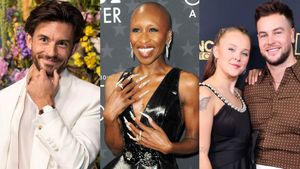Four female U.S. senators shared their experiences of sexual harassment and intitmidation today on NBC's Meet the Press - while a conservative political analyst, also a woman, claimed sexual harassment revelations are in part a "war on men."
Sens. Claire McCaskill, Heidi Heitkamp, Elizabeth Warren, and Mazie Hirono told of enduring harassment at various points in their careers. McCaskill said that when she was a young state representative in Missouri, she went to the speaker of the House to ask for advice on how to get her first bill out of committee. "And he looked at me, and he paused, and he said, 'Well, did you bring your knee pads?'" McCaskill recalled. "I do think he was joking. But it was shocking that he would make that joke to a colleague, even a very young colleague."
Warren told of being chased around the office of a senior faculty member when she was beginning her career as a law professor. Hirono recalled being propositioned by colleagues. And Heitkamp noted that at an event where she had spoken on domestic violence as North Dakota's attorney general, "a law enforcement official came up to me and he pretty much put his finger in my face and he said, 'Listen here, men will always beat their wives and you can't stop 'em.'"
But Danielle Pletka, a senior vice president of the American Enterprise Institute, expressed concern about a "war on men" and said that some women participating in the #MeToo campaign in the wake of the Harvey Weinstein sexual harassment allegations "want to get on the gravy train."
"I have no doubt that sexual harassment is real and that many women suffer from it," she said. "But I have a strong suspicion that this is yet another one in a series of isms and complaints and grievances in our society that are used as wedges, that are used as bludgeons, that are part of, frankly, what many men feel is a war on men, certainly in universities.
"So, you know, do we need a cultural change? If women want to stand up for themselves, women should stand up for themselves for equal treatment. And if that means that someone's going to harass them, they should stand up and call them out. This whole 'Me, too, I want to get on the gravy train, Harvey Weinstein looked at me meanly too but I didn't have the guts, Gwyneth Paltrow, to stand up and do anything about it,' I'm not really into that."
New York Times reporter Helene Cooper noted that when, where, and how to go public about sexual harassment and other abuse, such as domestic violence, is a deeply personal decision. She was working on a book about Liberian President Ellen Johnson Sirleaf, the first woman elected president of an African country, and Sirleaf was reluctant to discuss that she was a survivor of domestic violence, Cooper said.
"There's so much wrapped up into this that I think every woman who wants to speak up should be allowed to do so and should feel that she can speak up when she wants to," Cooper said. "But to ... it's also very difficult to put the onus on the woman to talk at a time where she may not want to."
Watch clips below; the one of Pletka is courtesy of Media Matters.




































































Charlie Kirk DID say stoning gay people was the 'perfect law' — and these other heinous quotes